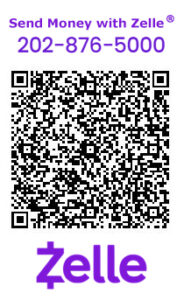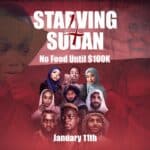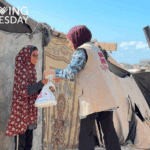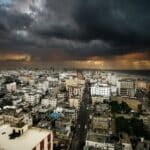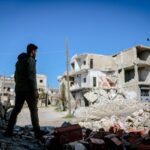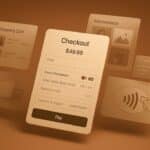Ramadan Aid: Top 5 Best Charities 2025
Why Ramadan Aid Matters More Than Ever
Ramadan aid provides essential food, water, and medical support to millions of vulnerable families during Islam’s holiest month. During Ramadan, food prices can spike by 50-100%, making it impossible for struggling families to afford basic meals for Iftar and Suhoor. Organizations respond by distributing food packages, hot meals, and emergency supplies to those most in need.
Top 5 Ramadan Aid Organizations:
- Islamic Relief USA – Over 1 million beneficiaries, food boxes in 40+ countries
- Zakat Foundation of America – Orphan sponsorship and hot Iftar meals
- United Mission for Relief and Development (UMR) – Medical relief and WASH programs
- Helping Hand for Relief and Development (HHRD) – Country-specific campaigns and skills development
- Baitulmaal – Emergency aid in hard-to-reach crisis zones
The Prophet Muhammad (PBUH) said: “He is not a believer whose stomach is filled while his neighbour goes hungry.” This teaching becomes especially powerful during Ramadan, when Muslims worldwide increase their charitable giving through Zakat (obligatory alms) and Sadaqah (voluntary charity). Last Ramadan alone, major organizations distributed over 5.7 million meals and reached more than 2 million people across 42 countries.
But not all Ramadan aid organizations operate the same way. Some focus on emergency food relief, while others invest in long-term solutions like water wells and livelihood programs. Costs vary too – a family food package ranges from $60 to $300 depending on location and contents. Transparency matters. The best organizations allocate 90% or more of donations directly to programs, publish detailed impact reports, and maintain strong ratings from charity evaluators like Charity Navigator and GuideStar.
At UMR, our experience managing seasonal campaigns and engaging with donors has shown us what separates effective organizations from the rest. Through years of work in donor relations and data-driven storytelling, we’ve learned how to ensure contributions make the maximum possible impact.
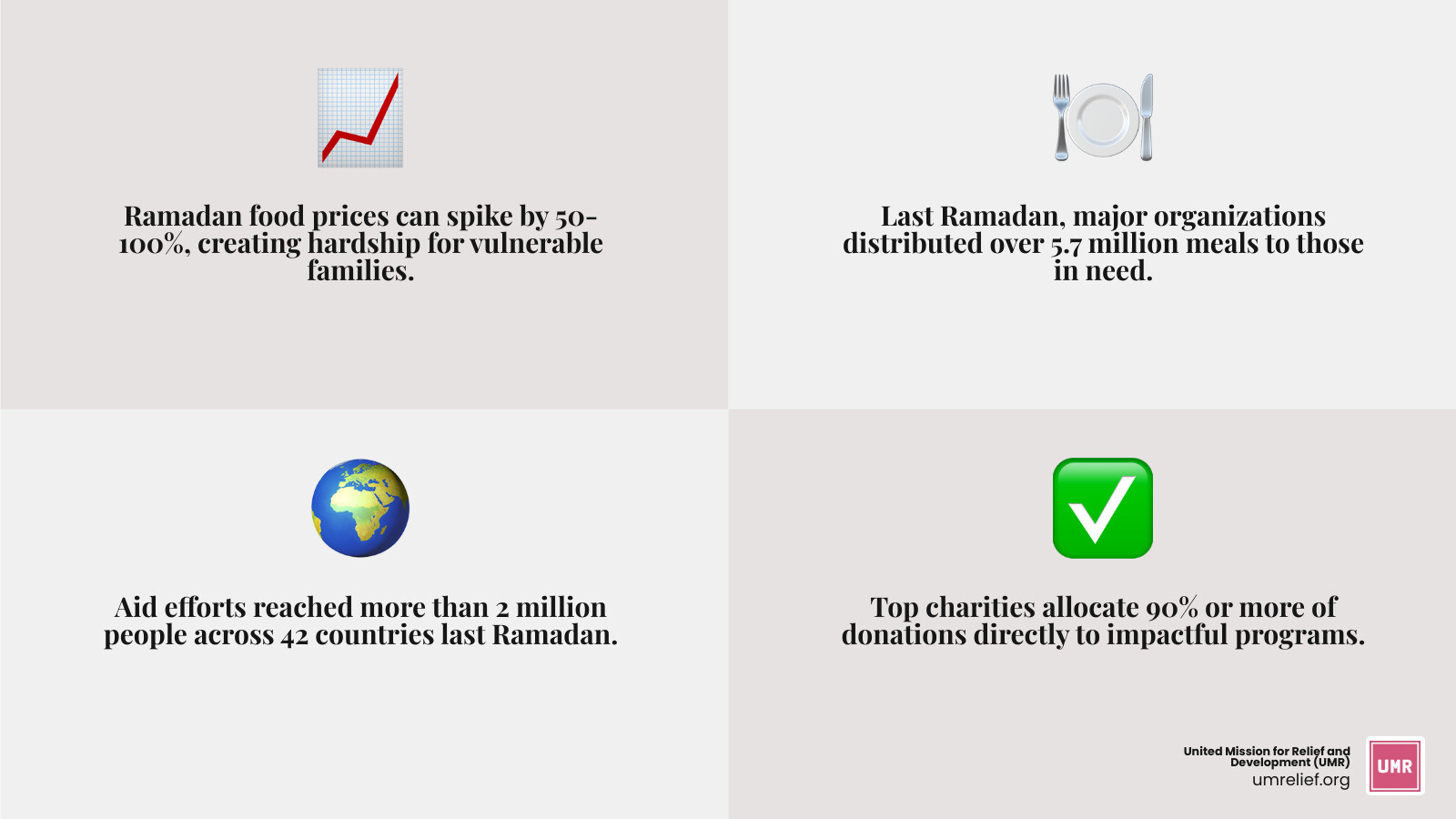
How We Chose the Best Ramadan Aid Organizations
When it comes to directing your Ramadan aid, you deserve to know your donation will actually make a difference. With so many organizations asking for support during this blessed month, we wanted to cut through the noise and help you find partners you can trust completely.
We didn’t just compile a random list. Instead, we evaluated dozens of organizations using the same rigorous criteria that guide our work at UMR. Think of this as the checklist we’d use if we were donors ourselves—because ultimately, that’s what matters most.
Financial transparency sits at the top of our evaluation criteria. The best organizations don’t hide their numbers—they publish detailed annual reports showing exactly where every dollar goes. We specifically looked for charities that allocate at least 90% of donations directly to programs rather than overhead. When an organization openly shares that 90% funds programs, 4% covers administration, and 6% supports fundraising, that’s the kind of honesty that builds trust. You can see this commitment in action by reviewing our financial reports on the UMR website.
We also relied heavily on independent charity evaluator ratings from organizations like Charity Navigator and GuideStar. These watchdogs do the heavy lifting of analyzing financial health, accountability practices, and governance structures. High ratings from multiple evaluators tell us an organization isn’t just talking about impact—they’re proving it with data.
Program effectiveness goes beyond just moving money around. We examined impact reports and field stories to understand the real-world difference each organization creates. Does a food box just feed a family for a week, or does it come with nutrition education? Are hot Iftar meals distributed with dignity, or do families wait in long, chaotic lines? The details matter because they reveal whether an organization truly understands the communities it serves.
Global reach matters too, especially during Ramadan when needs spike across multiple continents. We prioritized organizations operating in regions facing the most severe humanitarian crises—places like Gaza, Sudan, Yemen, Jordan, Palestine, Kenya, and Bangladesh. These are areas where UMR also works, so we understand how challenging it is to deliver aid effectively in conflict zones and disaster-affected regions.
Finally, we considered donor feedback and testimonials. While ratings and reports tell one story, hearing from actual donors about their experience—from communication to transparency to feeling connected to the impact—adds an essential human dimension to our evaluation.
This combination of hard data and real-world insight helped us identify organizations that don’t just collect donations during Ramadan, but truly partner with communities to create lasting change. Because your Ramadan aid deserves nothing less.
Top 5 Organizations for Ramadan Aid in 2025
As we enter this blessed month, many of us want to extend our help to those who need it most. The question is: which organizations will make the best use of our Ramadan aid? Based on our rigorous evaluation criteria, we’ve identified five leading organizations that truly deliver impact where it matters.
1. Islamic Relief USA
Islamic Relief USA has built something remarkable over the years—a truly global network that reaches vulnerable families in over 40 countries. During Ramadan, this network becomes a lifeline for families struggling to put food on the table.
Their Ramadan aid approach is straightforward and effective. For $125, you can provide a food box that feeds a family for the entire month. These aren’t generic packages—they’re custom to local tastes and needs, filled with staples like rice, wheat, lentils, oil, sugar, and dates. In some areas, they provide vouchers instead, letting families choose what they need most. It’s a small detail that makes a big difference in preserving dignity.
The numbers speak for themselves: Islamic Relief USA aims to reach over 1 million beneficiaries this Ramadan. They work in many of the same regions where UMR operates, including Jordan, Lebanon, Pakistan, Palestine, Somalia, Sudan, Turkey, and Yemen. Their emergency response teams are always ready to pivot when crisis strikes, ensuring aid reaches communities quickly.
What really captures the spirit of their work are the moments of joy they create. The smiles, the relief, the celebration—you can see it in pictures: Eid celebrations around the world, where families gather to mark the end of Ramadan with full hearts and full stomachs.
2. Zakat Foundation of America
The Zakat Foundation of America brings a laser focus to their work, channeling donations through programs that align perfectly with Islamic principles of charity. Their Ramadan aid efforts center on two powerful initiatives: hot Iftar meals and orphan sponsorship.
Picture a refugee camp in Yemen or a struggling neighborhood in Palestine. As the sun sets and the call to prayer echoes, volunteers arrive with hot meals—warm, nourishing food to break the fast. It’s such a simple thing, but for a mother worried about feeding her children, it’s everything.
Their food packages are substantial—55 pounds of staples that can sustain a family throughout Ramadan. But what sets them apart is their commitment to long-term change. Their livelihood programs help families build skills and achieve self-sufficiency, addressing the root causes of poverty rather than just the symptoms.
The orphan sponsorship program is particularly moving. For just $2 a day, you can ensure a child receives education, healthcare, and emotional support. They operate in some of the world’s most challenging environments—Yemen, Bangladesh, Kenya, Palestine, and Somalia—bringing hope to places that desperately need it. If this resonates with you, you can learn more through our guide on Zakat for Orphans.
3. United Mission for Relief and Development (UMR)
Here at UMR, we’ve built our Ramadan aid programs on a foundation of comprehensive care and sustainable impact. We don’t just show up during the holy month—we’re there year-round, building relationships and understanding the unique challenges each community faces.
Our work spans Jordan, Palestine (including Gaza), Lebanon, Sudan, Kenya, Yemen, Pakistan, Bangladesh, Somalia, Turkey, and the United States. In each location, we focus on what matters most: health and medical relief, clean water access, emergency response, and long-term development.
In Palestine, our teams work tirelessly to provide Palestine Medical Aid to communities facing severe healthcare challenges. When cholera threatened Sudan, we were on the ground responding to Sudan’s Cholera Humanitarian Crisis with medical interventions that saved lives.
Our WASH programs might not seem directly related to Ramadan, but they’re crucial. Imagine fasting without access to clean water for ablution or preparing meals. We build water wells and deliver clean water systems that serve communities for generations. During emergencies in Gaza and Sudan, our response teams mobilize quickly, delivering food, medicine, and water to thousands of families when they need it most.
What makes us different is our commitment to sustainable development. We’re not interested in temporary fixes. Through education and livelihood programs, we help people build better futures for themselves and their families. Our Ramadan aid creates ripples that extend far beyond the month itself.
4. Helping Hand for Relief and Development (HHRD)
HHRD takes a personalized approach to humanitarian work, designing country-specific campaigns that address unique local needs. Their Ramadan aid efforts shine brightest in their work with orphans and vulnerable children—they understand that every child deserves not just survival, but a real chance to thrive.
Their orphan support goes beyond basic necessities. They provide educational opportunities, mentorship, and the kind of consistent care that helps children envision a brighter future. During Ramadan and Eid, they distribute gifts to children, bringing joy to young hearts that have known too much hardship. If you’re moved to help, our resource on How to Donate to Orphans offers guidance.
What really sets HHRD apart is their investment in skills development and vocational training. They recognize that the best way to help a family isn’t just to give them food for a month—it’s to help them gain skills that lead to steady income and economic independence. This approach transforms Ramadan aid from a temporary relief into a catalyst for lasting change.
Their work in Bangladesh and other regions demonstrates how targeted, thoughtful programs can break cycles of poverty. When you support HHRD, you’re not just helping someone through Ramadan—you’re helping them build a different future.

5. Baitulmaal: Effective Ramadan aid for crisis zones
Baitulmaal has earned its reputation by going where others struggle to reach—the hard-to-access crisis zones where need is greatest and help is scarce. Their Ramadan aid focuses on emergency response and sustainable solutions, particularly through water projects that serve communities long after the holy month ends.
In Kenya, where chronic hunger affects millions, Baitulmaal provides critical nutrition support. Their work to Feed Starving Children in Kenya ensures that children receive the nourishment they desperately need, especially during Ramadan when food scarcity becomes even more acute.
Their water projects represent some of the most impactful work in humanitarian aid. By funding and constructing new water wells, they address a fundamental need that affects every aspect of life—health, hygiene, cooking, and especially during Ramadan, the ability to maintain ablution and break fast with clean water. These wells become a source of continuous charity (Sadaqah Jariyah), benefiting entire villages for years to come.
Baitulmaal’s agility in emergency aid means they can respond quickly when crisis strikes. Their seasonal programs are designed specifically for Ramadan, maximizing impact during this blessed month when every act of charity carries multiplied rewards.

Understanding Different Types of Ramadan Donations
During Ramadan, many of us feel called to give more generously, but understanding the different types of donations can sometimes feel confusing. Islam actually provides clear guidance on several forms of giving, each serving a unique purpose in caring for those in need. Let me walk you through the main types of Ramadan aid you might consider this blessed month.
Zakat al-Fitr: A Mandatory Charity to Purify the Fast
Zakat al-Fitr is a special obligatory donation that every Muslim must give before the Eid al-Fitr prayer. Think of it as a way to purify your fast from any minor mistakes or distractions that may have occurred during Ramadan. It’s also a beautiful way to ensure that even the poorest families can celebrate Eid with dignity and joy.
The amount is typically fixed per person—usually equivalent to about four handfuls of staple food like wheat, rice, or dates, or its cash value. You give it for yourself and everyone you’re responsible for, including your children. The timing matters here: it must be paid before the Eid prayer begins, so the recipients can use it to prepare for their Eid celebrations.
This simple act transforms Eid from a day some families might struggle through into a genuine celebration for everyone in the community. When you pay Zakat al-Fitr, you’re helping a mother buy ingredients for a festive meal, or enabling a father to give his children small gifts. For more details on calculating and giving this important charity, visit our page on What is Zakat al-Fitr.
Fidya and Kaffarah: Compensation for Missed Fasts
Life doesn’t always allow everyone to fast, and Islam recognizes this reality with compassion. If you’re unable to fast due to chronic illness, old age, pregnancy, or other valid long-term reasons, Fidya offers you a way to still participate in Ramadan’s spirit of giving.
For each day you can’t fast, you feed a needy person two meals. Many organizations set the Fidya amount at around $10 per missed day, making it straightforward to calculate and fulfill. This isn’t a penalty—it’s an alternative form of worship that shifts from personal abstinence to feeding others.
Kaffarah is different and more substantial. It applies when someone deliberately breaks a fast without a valid excuse, or breaks a solemn oath. The compensation involves either fasting for 60 consecutive days or feeding 60 poor people two meals each. That typically amounts to around $480 per broken fast. It’s a serious commitment that reflects the gravity of intentionally breaking one’s fast.
Both of these donations ensure that the principle of caring for the hungry remains central, even when circumstances prevent you from fasting yourself. We’ve made it easy to fulfill these obligations—you can Pay Fidya Online through our secure platform, and we’ll ensure your contribution reaches those who need it most.
General Sadaqah: The cornerstone of voluntary Ramadan aid
While Zakat al-Fitr, Fidya, and Kaffarah have specific rules and amounts, Sadaqah is beautifully flexible. This voluntary charity can be given at any time, in any amount, for any good cause—though giving it during Ramadan carries multiplied rewards.
Sadaqah is where your heart can truly guide your giving. You might donate $25 to provide emergency food relief, or $250 for a share in a water well that will serve a community for decades. You could support orphan care programs that give vulnerable children education and hope, or contribute to medical relief for families in crisis zones like Gaza or Sudan.
The word Sadaqah comes from the Arabic root for “truthfulness,” reflecting how this giving demonstrates the sincerity of your faith. It’s not about the amount—it’s about the intention and the impact. A widow’s small donation to help another struggling family carries as much spiritual weight as a wealthy person’s larger contribution.
This flexibility makes Sadaqah the cornerstone of Ramadan aid. It allows you to respond to urgent needs as they arise, support causes you’re passionate about, and create lasting change through sustainable projects. Whether you’re moved by images of children receiving clean water for the first time or families breaking their fast with dignity, Sadaqah lets you act on that compassion immediately.
To understand the deeper spiritual dimensions of giving and how it transforms both giver and receiver, explore our article on the Importance of Charity in Islam. Your generosity during this blessed month—whether obligatory or voluntary—becomes part of a global wave of compassion that lifts entire communities.
Frequently Asked Questions about Ramadan Aid
We understand that navigating charitable giving can bring up important questions, especially when you want to ensure your Ramadan aid reaches those who need it most. Here are answers to some of the most common questions we hear from donors like you.
What is Zakat al-Fitr and how is it different from Zakat al-Maal?
These two forms of Zakat often get confused, but they serve different purposes and have distinct rules. Think of Zakat al-Fitr as the “end-of-Ramadan purification payment” and Zakat al-Maal as your “annual wealth tax.”
Zakat al-Fitr is a small, fixed donation that every Muslim—regardless of their wealth—must give before the Eid prayer at the end of Ramadan. It’s beautifully simple: around $10 per person in your household, including children. The purpose is twofold: to purify your fast from any shortcomings and to ensure that even the poorest families can celebrate Eid with dignity and joy. It’s not about how much money you have in the bank; it’s about making sure everyone can share in the celebration.
Zakat al-Maal, by contrast, is calculated on your accumulated wealth over the course of a year. If your savings, gold, silver, business assets, or investments reach a certain threshold (nisab) and you’ve held them for a full lunar year, you owe 2.5% of that wealth in Zakat. This is a more substantial obligation that redistributes wealth throughout the community and supports various categories of recipients outlined in the Quran.
The key differences? Timing, amount, and who pays. Zakat al-Fitr is per person, due before Eid prayer, and relatively small. Zakat al-Maal is based on wealth, due annually, and typically a larger sum. Both are essential pillars that ensure economic justice and community care. For a deeper dive into these differences, check out our detailed guide on Zakat al-Maal vs Zakat al-Fitr.
How much does a Ramadan food box typically cost?
This is one of the most practical questions we receive, and the answer is: it depends, but we can give you a solid range to work with.
Most Ramadan aid organizations price their food boxes between $100 and $125 for a package that feeds a family for the entire month of Ramadan. These boxes are packed with culturally appropriate staples—rice, wheat, lentils, cooking oil, sugar, and dates—customized to local dietary needs and preferences. For example, a $125 donation to Islamic Relief USA provides a complete month’s supply for one family.
In crisis zones where logistics are more challenging and food prices are higher, costs can increase. An emergency food parcel for Gaza might run $250 for a family of five, while Sudan might be $150 for a family of seven, reflecting the additional difficulties of operating in conflict areas.
Many organizations also offer flexible donation tiers to accommodate different budgets. You might see options like $45 for three hot Iftar meals, $60 for a week’s worth of food, or $500 to sponsor five families for the entire month. These varied price points mean that whether you can give a little or a lot, your contribution makes a meaningful difference in someone’s Ramadan experience.
The beauty of these food boxes is that they don’t just fill stomachs—they restore dignity, allowing families to observe the holy month with the respect and joy it deserves.
How can I verify a charity before donating?
This is such an important question, and we’re glad you’re asking it. Your generosity deserves to reach its intended destination, and a little research goes a long way toward ensuring your Ramadan aid creates real impact.
Start by checking the organization’s 501(c)(3) status if they’re US-based. This IRS designation confirms they’re a legitimate non-profit, and it makes your donation tax-deductible. But don’t stop there—that’s just the baseline.
Independent charity evaluators like Charity Navigator, GuideStar (now Candid), and the BBB Wise Giving Alliance provide comprehensive assessments of organizations’ financial health, accountability, and transparency. High ratings from these watchdogs indicate that an organization follows best practices and uses donations effectively. At UMR, we’re proud to maintain strong ratings that reflect our commitment to transparency.
Dig into the organization’s financial reports. Reputable charities publish detailed annual reports and Form 990s that show exactly how donations are allocated. Look for organizations that direct 90% or more of funds to programs rather than overhead. You can review our own financial transparency by viewing our financial reports.
Beyond the numbers, examine impact reports and program details. Do they provide specific examples, real stories, and measurable outcomes? Can they tell you exactly how many families were fed, how many wells were built, or how many children received medical care? Concrete details signal genuine impact.
Finally, consider how the organization aligns with Islamic charitable principles. For Ramadan aid, this matters. Does the organization understand the specific rules for Zakat distribution? Do they respect the dignity of recipients? Resources from academic institutions can offer insights into Islamic charitable principles that guide effective, religiously sound giving.
Trust your instincts, too. If an organization is evasive about finances, vague about impact, or pressures you to donate immediately, those are red flags. The best organizations welcome your questions and are eager to demonstrate their effectiveness. Your due diligence ensures that your generosity transforms lives in the way you intend.
Conclusion
As the blessed month of Ramadan comes to a close, the lessons of compassion, sacrifice, and generosity stay with us. The Ramadan aid we provide together doesn’t just fill empty stomachs or provide temporary relief—it restores dignity, kindles hope, and plants seeds of lasting change in communities facing unimaginable hardship.
Every donation you make creates ripples of impact that extend far beyond a single meal or a month of support. When you contribute to a Ramadan food box, you’re helping a mother feed her children with pride. When you fund a water well, you’re giving an entire village access to clean water for generations. When you support orphan care or medical relief, you’re literally saving and changing lives. This is the profound power of collective charity during Islam’s holiest month.
Choosing a trusted partner for your Ramadan aid makes all the difference. Organizations with proven financial transparency, strong effectiveness ratings, and deep community roots—like Islamic Relief USA, Zakat Foundation of America, United Mission for Relief and Development (UMR), Helping Hand for Relief and Development (HHRD), and Baitulmaal—ensure that every dollar you donate goes as far as possible. These organizations don’t just deliver aid; they build relationships, understand local needs, and create sustainable solutions that empower communities to thrive.
At UMR, we’re deeply honored to walk alongside you in this journey of compassion. Our teams work tirelessly across Jordan, Palestine, Lebanon, Sudan, Kenya, Yemen, Pakistan, Bangladesh, Somalia, Gaza, and Turkey, delivering emergency relief while investing in long-term development. We see how your generosity transforms despair into hope, vulnerability into resilience, and poverty into possibility.
As you reflect on your giving this Ramadan, we invite you to continue this sacred tradition throughout the year. Learn more about fulfilling your Zakat obligations and find how your ongoing support can create lasting impact in the lives of those who need it most.
Together, we’re not just providing aid—we’re building a more compassionate world, one act of kindness at a time.


